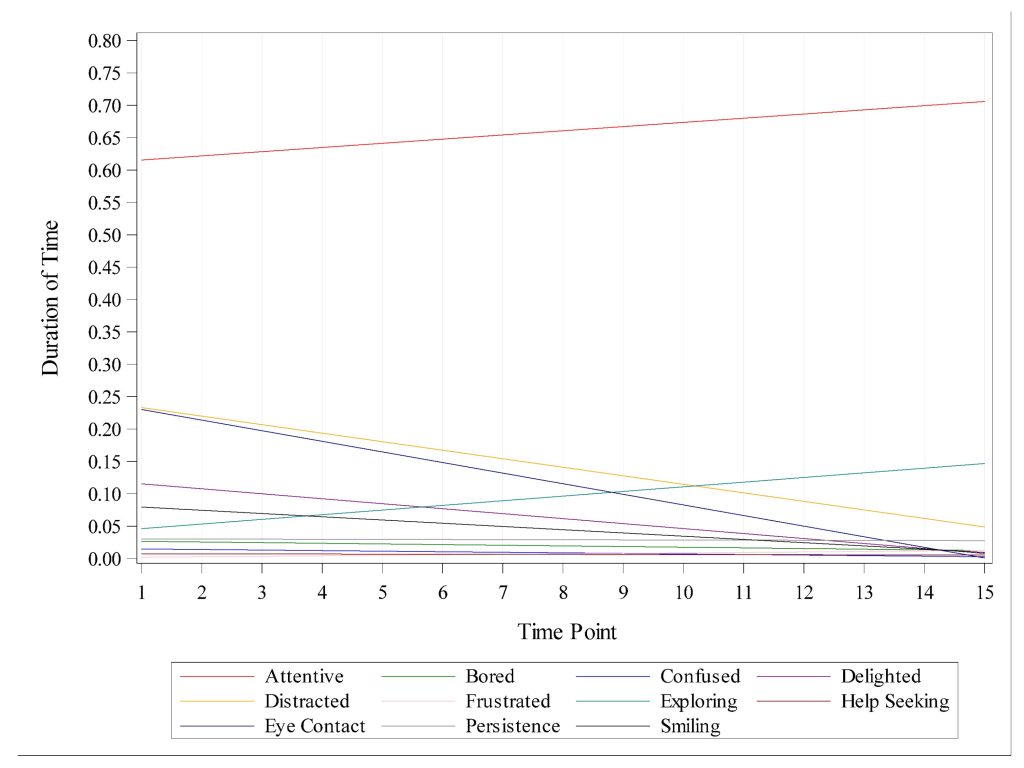Changes in behavior and affect states over time. Duration of time is measured as the ratio of observed behavior to the recorded footage of each occasion. Credit: Journal of Intelligence (2022). DOI: 10.3390/jintelligence10040118
New findings from the University of Houston may reverse some of the prevailing wisdom about the scourge of screen time and digital devices in the hands of young children. The research is the first to focus on a child under three and reveals that while digital technology may bore, distract and confuse them, those are the same emotions that promote creativity and learning.
“One possible benefit from digital-based learning (DGBL) could be the freedom to engage in mind-wandering—those moments when attention shifts away from the task at hand and onto something unrelated. Mind-wandering may provide a child time and space to engage in creative problem solving, also referred to as a time of creative incubation that enhances their ability to learn,” reports Elena Grigorenko, Hugh Roy and Lillie Cranz Cullen Distinguished Professor of Psychology, and her colleagues, in Journal of Intelligence.
“We present evidence that DGBL apps may improve learning by capitalizing on positive and avoiding negative mind-wandering.”
The research is exceedingly well-timed as the learning environment continues to evolve to include new technologies. Portable digital devices are omnipresent and integrated into activities that did not previously require them. The related skills are often referred to as 21st-century skills, constituting a new type of literacy: digital literacy.
“These devices and skills bring unique, innovative elements to the learning experience; yet we do not know the extent to which behavior, emotion and socialization are affected by such experience. To find out, we conducted the second in a series of studies involving a 28-month-old named ‘Ryan,’ giving him his first opportunity to use an iPad,” said Hechmi Kilani, graduate student in Grigorenko’s lab and co-author of the study. Other members of the team and co-authors include former postdoctoral fellow Shiva Khalaf and former undergraduate student Melissa B. Razo.
Results of the first study showed Ryan increasing his speed and proficiency in using the iPad over the period of five weeks. Psychologically, his displays of attentiveness, help-seeking and persistence correlated to a positive mind-wandering outcome: increased creativity.
For the “Ryan 2” test, the team focused further on mind-wandering, defined as moments of boredom or distraction, and concluded that it contributed to positive learning outcomes when Ryan exhibited more attentiveness to the games he played and was able to effectively navigate to an app he liked and within the app itself.
“We evaluated the effects of bouts of mind-wandering as he played various DGBL apps by examining the length of time that Ryan exhibited relevant affective and behavioral states, iPad manipulations and social interaction during the playtime,” said Khalaf.
Ryan’s interactions with the iPad were video recorded for five weeks, and the video footage was coded using a detailed rubric. The recordings were also coded for caregiver verbalizations to explore the roles of a caregiver and of social interactions in digital literacy acquisition and learning. The results indicated that emotions, such as boredom, distraction and confusion, if coupled with attentiveness and persistence, led to positive mind-wandering and positive learning outcomes.
Evidence also showed that the presence of a supportive caregiver increased Ryan’s overall success.
“Through the course of the study, we found that Ryan’s states of confusion and distraction, in addition to his help-seeking behaviors, gave way to attentiveness and increased proficiency while using the device. We believe this to be evidence that a child who is allowed to engage in mind-wandering while in the company of a caregiver will be able to engage in creative problem solving, that this will positively contribute to their learning, and that these results can be achieved using a DGBL app on an iPad,” said Razo.
The case study calls attention to the need for more research to verify that apps which are promoted as educational truly offer learning benefits to young users and that the apps designed for preschool children actively involve the child, encourage social interaction with caregivers, are engaging and meaningful and generate a safe and productive opportunity for learning and development.
More information: Shiva Khalaf et al, Bored, Distracted, and Confused: Emotions That Promote Creativity and Learning in a 28-Month-Old Child Using an iPad, Journal of Intelligence (2022). DOI: 10.3390/jintelligence10040118
Provided by University of Houston
Citation: Digital technology found useful to assist toddlers with problem solving (2023, January 17) retrieved 15 February 2023 from https://phys.org/news/2023-01-digital-technology-toddlers-problem.html
This document is subject to copyright. Apart from any fair dealing for the purpose of private study or research, no part may be reproduced without the written permission. The content is provided for information purposes only.

